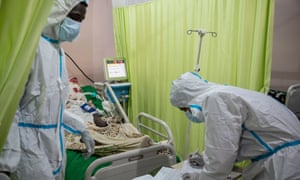African countries may suffer in the global rush for vaccines because they are unable to gather statistics that reveal the true extent of the spread of Covid among their populations, epidemiologists and other experts fear.
According to data from Johns Hopkins university, there have been 3.7m confirmed cases in Africa, and the landmark figure of 100,000 confirmed deaths is likely to be reached within days.
A series of studies has raised fears that the official figures are a significant underestimate, raising the possibility that Africa may not be seen as a priority for scarce global vaccine supplies despite the urgent need.
Many African countries are unable to afford mass testing and lack capacity to collect reliable data on cases and deaths, especially in remote areas. Stigma attached to the disease, a lack of information and victims’ inability to either reach or pay for health facilities may also reduce reporting.
The World Health Organization has said the “unique socio-ecological make-up in a number of African countries means a slower rate of transmission, and fewer severe cases as compared to the hardest hit countries”.
Mortality rates have been relatively low across Africa compared with other regions, though they are rising.
Dr Oliver Watson, an infectious disease expert at Imperial College London, said the shortcomings in data collection on the continent could undermine efforts to secure equitable access to vaccines.
“Some might argue the need for vaccines is much less urgent … so the vaccines will go to countries with stronger reporting systems and so further entrench inequity,” he said.
A study by scientists from ICL’s Covid-19 response team in Sudan found that only about 2% of Covid deaths had been reported in the capital, Khartoum, through most of last year. As a result, the team estimated that as many as 16,090 deaths may have been unaccounted for as of 20 November. Sudan has officially recorded fewer than 30,000 cases and 1,849 deaths.
According to UK Sudan’s Doctors’ Association, 40 doctors are thought to have died of Covid in the country between March and January. As of 6 February, 1,107 health staff had been tested for Covid with 76% returning a positive result.

Dr Ibrahim Fahal, the president of the UK-based Sudan Medical Care Foundation, said frontline medical staff faced acute shortages of PPE, limited safety measures and very large numbers of patients. “They are very exposed,” he said. “A way to get them vaccines has to be found and as soon as possible.”
A study by the Boston University School of Public Health in Zambia concluded that Africa’s relatively low numbers of Covid cases might simply be “a matter of lack of testing, with the coronavirus actually taking a terrible but invisible toll across the continent”.
The study, which is expected to be published in the British Medical Journal in the coming days, found that more than 15% of recently-deceased people arriving at the main morgue in the capital, Lusaka, over the summer tested positive for Covid. Despite most having had symptoms, few were tested before death.
